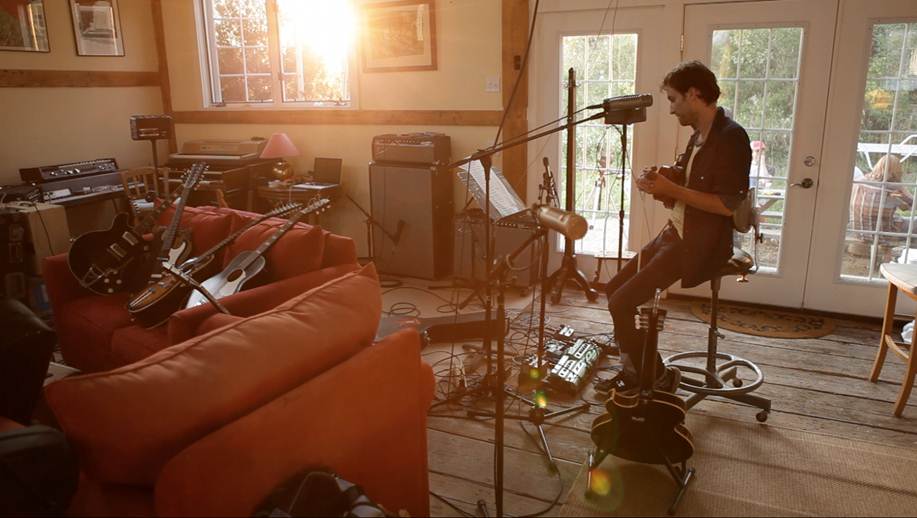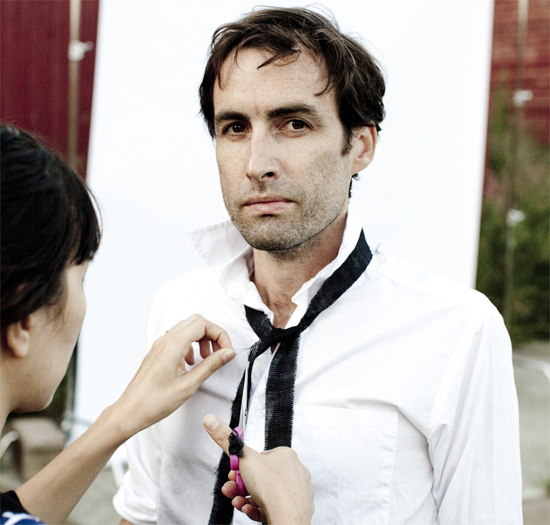“You’ve done the impossible now/ took yourself apart/ made yourself invulnerable/ no one can break your heart/ so you break it yourself” Andrew Bird – ‘Eyeoneye’
It’s probably safe to say that there are more songs about love or unrequited love than there are songs about anything else. Less documented is a very modern phenomena that pervades so much of our lives, though is not exclusive to modern times, and that’s self-reliance. Not onanism per se, but the point where one becomes so self-sufficient that the need for anybody else becomes diminished to the point of social isolation and exclusion. In an age where you hardly need leave the house when everything can be delivered at the touch of a button, what’s the logical conclusion? What happens when you become an island? It’s an idea Andrew Bird explores on his new album, Break It Yourself, (and in particular the track ‘Eyeoneye’ where that titular lyric is borrowed from).
Andrew Bird is never likely to make a concept album, because his albums are teeming with concepts. They appear as songs, and within verses, and sometimes there are more than one bursting out from a single line or verse, but it’s this idea that is the lead concept if you will. I meet him at a West London hotel, and he appears a little exhausted from all the promotional obligations and is going down with a virus, though he’s polite and engaging. He talks slowly and deliberately, and at one point when he utters a sentence that doesn’t quite cut it he almost admonishes himself for articulating words of insignificance, saying, ‘Let’s start over.’ It’s as though there are too many words out there already, and his should be compact and concise. In fact at points during the interview it seems that he’s talking cryptically, and it’s only when transcribing that some of what he’s saying reveals itself fully, like some kind of pragmatic shaman or secular prophet.
Hello Andrew, what’s the significance of the title Break It Yourself?
Andrew Bird: I thought it just kinda cut to the quick, you know? All the ideas I had for a title just sounded so annoyingly poetic, so I thought I’d go with something a little more aggressive or extroverted or something. And it’s a line from the song ‘Eyeoneye’, which I think is a sort of breakthrough song for me in a sense. I finally figured out how to bridge the metaphor with the down to earth personal. There are other songs that deal with that same idea of ‘break it yourself’ – being that the downside of autonomy is being an island. If you’re so self-sufficient, who’s going to put you through the ringer and who’s going to break your heart? You do it yourself, which of course is impossible. It’s as impossible as seeing your own eyeball. It’s all about getting so close to the source that things start to shutdown.
So when you talk about autonomy you’re talking about personal autonomy?
AB: Right. I talked about it on Noble Beast too, on the song ‘Anonanimal’; you’re becoming this animal that’s adapted to this weird environment you’ve created for yourself. You’re kind of mutating into this thing that survives, like a salamander in a cave in Mexico with no eyes. Because it doesn’t need ‘em because it’s dark. Anonaminal was in that cave, but this one is breaking out in a way.
So you’ve evolved?
AB: I think so. Something happened when I was writing this record. And you can hear it I think, half way through a lot of the songs, a switch has flipped. You get ionised; the polarities reverse, or something.
You’ve been accused of being ‘wilfully obtuse.’ I reviewed The Mysterious Production of Eggs some years ago and gave it a decent enough write up, but then I kept hearing it around the house and was like, "What is this? It’s amazing.” Your music is certainly not impenetrable, but it unlocks with repeat listens more than any other music I know.
AB: I’m not the most direct person, and so it makes sense that my songs aren’t terribly direct either. The path needs to be encoded. I’m not a confessional singer/songwriter; I’ve always been into defining a different way to say it, a different way to twist it. Meanings that serve several purposes help protect my own privacy for one, and also when I have to play these songs every night, you can find something in it every night. But on the other hand you’re not totally laying it out there. And I’ve always in the past been like ‘why should I? Just because I’m a songwriter why do I have to lay it all out there?’ And part of the fun is encoding it too. I would say it’s true to who I am to do that. But nonetheless, I dunno, something happened with this one. I took a little more time off between records, I got a little more of a life outside of touring and I got a little tired of the poetics in a sense. And I wanted to just make a more direct record.
If you hear ‘Mother’ by John Lennon, the visceral power of that song is astonishing, and yet quite often you hear confessional singer/songwriters and you think, ‘well why would I be interested in you?’
AB: I used to feel that pretty strongly when I was in Chicago in the mid-90s; you’d go and see music and a lot of it was very, very raw, both lyrically and musically too. There’s this goddamn person staring at me. And at the time it wasn’t my thing at all. And I was also wondering, ‘Are you serious?’, that confessional thing. Because if you’re serious, how do you do that every night? One of those nights you’re going to start phoning it in because you’re a total chump, you don’t have any way to protect yourself. It’s interesting, somewhere in the 70s that idea of the autobiographical, confessional singer/songwriter was born and people have expected it ever since. But before that there was more of a division of labour. There was songwriting and arrangement in the recording industry, and you had Elvis walking into a sound-stage and singing someone’s song.

If you take a singer like Edith Piaf, she seems to mean every note, even if you don’t understand what she’s singing about. There’s this old idea that a true singer has to have experienced tragedy to truly express themselves. Is that true or bollocks?
AB: I don’t know, in that case she could be singing the phonebook, for lack of a better way of putting that. And in the same way when I take to the stage, I ought to be able to sing the phonebook and make it compelling. I ought to be able to sing Happy Birthday for forty-five minutes and make something cool out of it. So that’s ultimately what I fall back on; whatever you’re doing you’ve got to make it musical and make a performance.
‘Eyeoneye’ sounds quite… commercial’s not the right word… there are still intricacies and moments you’re not going to get first time around, but you’ve made a song that people will latch onto with a first listen I think.
AB: I hope so. I mean that song was filled with expectations from the beginning. It was half written – I’d written half the lyrics – and then I used it as an example when I did a talk at the TED conference in Long Beach. I used it as an example of how I write songs, though I hadn’t finished the song. Right from the beginning I knew where I was going with the melody and the lyrics could be like an immediate pop song. I was having trouble with the flow because I rarely write choruses, and every section of the song is kind of the chorus but nothing was obviously the chorus and I don’t like to repeat myself too much. So those things work against me in writing the formulaic pop song.
So tell me more about TED conference…
AB: It’s like a forum of ideas. You know, Bill Gates was there, it’s a funny thing. But you get to speak for 17 minutes, and you put across an idea. So I talked about the song being about this feedback loop, and I demonstrated this feedback, made a loop and put it up against it, and said ‘when you get too close to the source, all hell breaks loose’. That’s the sound of self destruction: feedback. So that was the beginning of that song; in nature when you feed chickens their own they cannibalise each other and you get horrible diseases – you get Mad Cow Disease for instance. When the body’s immune system is over-zealously attacked it can attack itself and shut everything down. And it’s all because of this phenomenon where things get too close to the source, so that was the beginning… I knew I had something going on there, I just had to make it make sense.
Was Bill Gates speaking or was he part of the audience?
AB: He was speaking but all speakers are a part of the audience. I guess entrepreneurs pay a lot of money to go to this thing. Al Gore, Bill Gates, mostly debuting new technology they bring in. And David Byrne was there, and just a bunch of smart people.
Speaking of smart people, you’ve collaborated with some interesting artists over the years, though tragically it’s The Muppets I’m most interested in. You’ve been on Muppets albums right?
AB: I did the tribute album and I did It’s Not Easy Being Green a couple of years ago. And between Noble Beast and this record I basically came back from a tour of Asia, didn’t go back to Chicago, rented a house in Venice Beach and tried not to do anything for a long time because I was totally burned out. But I started writing songs for The Muppets just to keep myself entertained. The chances of gettting a call from The Muppets is pretty slim and they have like 20 writers, like Stephen Merritt, all working on spec. I wrote four or five songs based on the script – they were like ‘we need a song here that does this’ – it was really fun. I grew up with The Muppets. It was being handled by the Flight of the Conchords director so there was a healthy irreverence in it. But in the end all I got in there was a whistling piece, but… it’s the climax. The whistling piece I wrote – the main character saves the day by whistling this aria.
Writing for something like The Muppets, I guess you’ve got to be direct?
AB: Yeah, you’ve got to move the story along. And that’s cool, it makes you feel like an old school songwriter from the Tin Pan Alley days. Where the songs about saving the fat from your frying pan or whatever – you know what I mean – you’ve got an assignment. Actually, some of those ideas that they didn’t take are on the album.
So what I really want to talk about is whistling. You’ve integrated it and it’s an integral part of your sound now, but when did you think it’d be okay to whistle on a record?
AB: I didn’t think to do it for the first three or four records. I thought maybe it was a kind of novelty thing so I was cautious about doing it at first. Then I was like, ‘What’s more honest than whistling?’ You know, I’m doing it every waking moment when I’m not talking. And also it made sense because my hands were already tied with other instruments.
When I was growing up there was Roger Whittaker and the ‘Skye Boat Song’, and not a lot of whistling besides. You say it’s natural to you, but it still sounds kind of far out.
AB: Yeah, well there’s the Sitting on the ‘Dock of the Bay’ kind of whistling and then there’s a lot more you can do with it; it can be kind of operatic. It can really cut through all the textures you make with the violin – its mid-range and warm and everything and the whistle just slices right through.
As a violinist you’re trained in Suzuki method. What’s that?
AB: You learn entirely by ear so even though it’s classical music it’s a folk tradition. You don’t learn to read music at all. I have all the technique but I don’t claim to be a classical musician.
If you take someone like Warren Ellis, he’s definitely not classical. I knew a classical violinist and I played her the Dirty Three and she didn’t get it at all. She couldn’t tap into the raw beauty of it at all and dismissed it as bad technique.
AB: It’s not classical at all. It’s cool. There’s no reason the violin has to be so institutionalised. Yeah, I’ve never been accused of [bad technique]; I think I play more like a jazz tenor player. I got into a little bit of Coltrane on this record, sheets of sound, more like blowing a breath of air… that’s what I can’t abide with classical music, when they try to crossover, everything’s so articulated, like it’s being strangled.
I don’t suppose you’d ever need to play in an orchestra because you’ve been ploughing your own furrow for so long. What you do nobody else does. It’s kind of testament to the doggedness of sticking to your vision.
AB: I guess I could say that, because I’ve just taken a weird path, and I’ve been doing this since I was 22 or 23. Yeah, I feel pretty fortunate and I haven’t boxed myself in either. I can do whatever. I have a nice audience that expects the unexpected. The other side of that is I feel it’s a huge responsibility to never phone it in.



